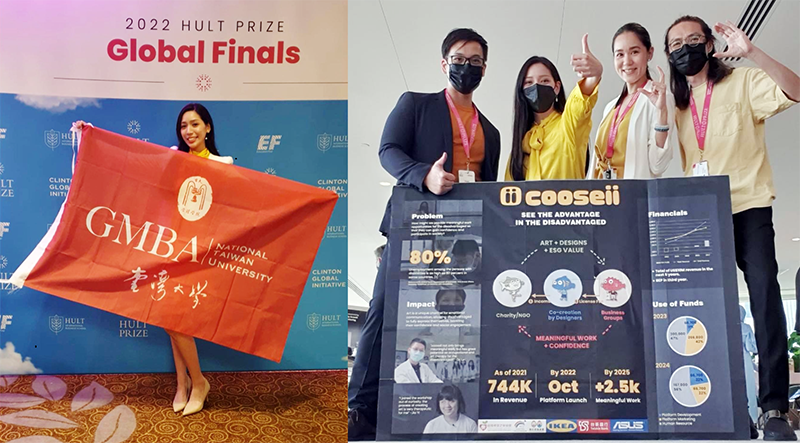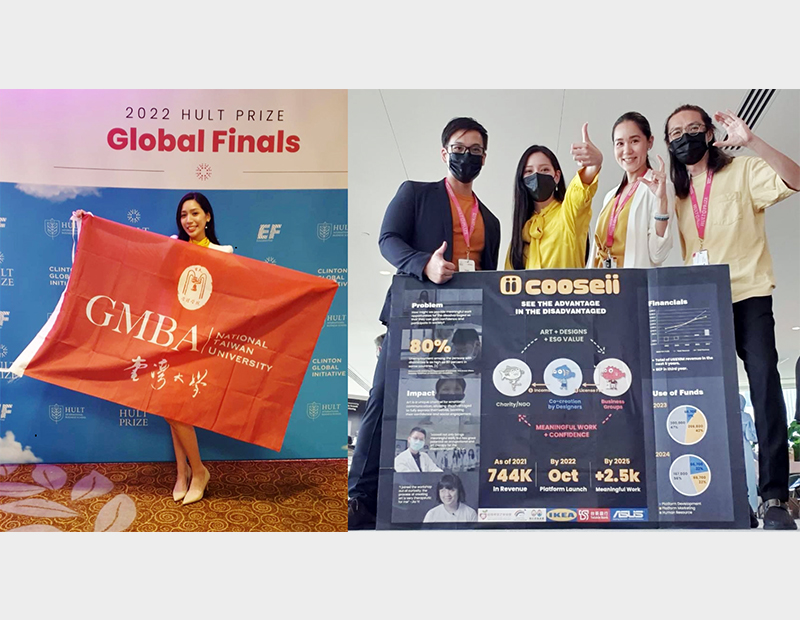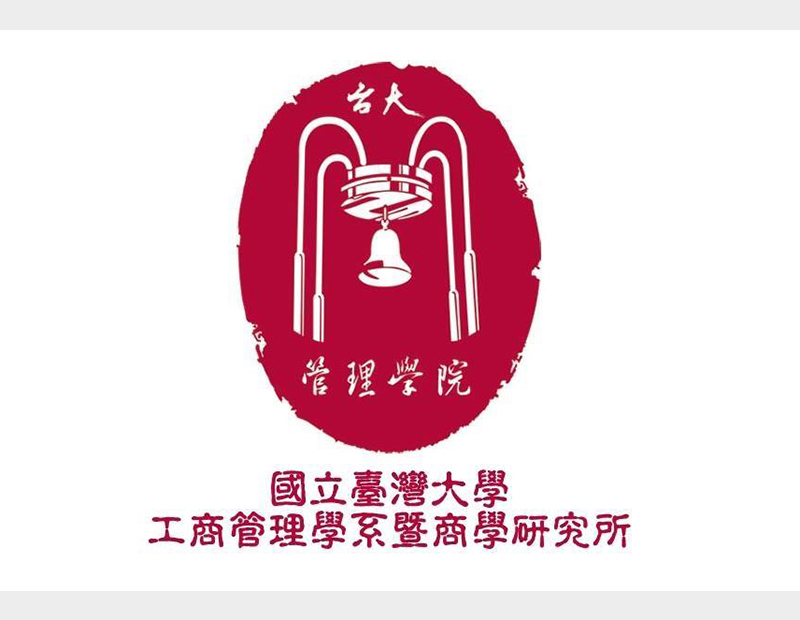GMBA學生郭安妮參加Hult Prize的賽後心得
國際事務室暨GMBA辦公室
撰文者/GMBA陳依瑾、GMBA學生郭安妮
身為GMBA的一份子,我很高興和大家分享這次與 EiMBA的 三位學長姊一同打進霍特獎決賽的心路歷程。我們是一支由EiMBA和GMBA的四位學生組成的“cooseii”隊,包括Mark Yeh(R09屆)、Irene Wang(R10屆)、YiChi Cheng(R08屆)和我(R10屆)。今年三月,我們獲得台大的校內比賽冠軍,並代表台灣和台大出賽五月所舉辦的亞太區資格賽,在擊敗韓國、日本、新加坡、馬來西亞、越南和香港的隊伍之後,順利取得亞太區的冠軍。八月份,我們被邀請到波士頓參加為期三週的加速器計劃,在那裡,與其他 27 支從世界各地的區域比賽中脫穎而出的團隊一起切磋。加速器計畫結束後,評審團從這28支隊伍中挑選出 6支參加 9 月在紐約舉行的 Global Hult Prize 總決賽。“cooseii”很榮幸脫穎而出,為自己也為台灣贏得在紐約比賽的重要門票。儘管最後cooseii在決賽中未能獲得第一名,但過去這六個月的旅程仍是我自大學畢業以來最棒的經驗。

恭喜GMBA學生郭安妮與EiMBA學生組隊參加 Hult Prize 進入總決賽
每年,聯合國與Clinton Global Initiatives會共同舉辦霍特獎競賽(Hult Prize),此項活動被譽為大學生的諾貝爾獎,它是一個為激發出學生創業與商業能力的全球性競賽。通過眾包(Crowdsourcing)即聚集群眾的力量來解決現實世界的問題,世界各地的大學生聯手發想一些解決全球社會問題的新點子,在糧食安全、能源、教育、和貧困等方面,通過創新的社會企業,學生被一步步帶領創建符合聯合國永續發展的商業模式。每年的冠軍團隊均可獲得 100 萬美元的資金,讓他們把點子變為現實計畫。霍特獎也透過每年不同的行動呼籲,喚起更多人的關注,例如,今年的行動呼籲是:讓世界恢復工作( 在2024 年以前能創造出 2000 個有意義的工作機會)。考量到這點,“cooseii”團隊以提供殘障者與弱勢族群一份有意義的工作,而不僅僅是給他們愛心捐贈為出發點,進而創造出一種新的經濟模式。
在紐約霍特獎競賽和波士頓為期三週的加速器計劃的整個過程中,我們團隊透過大大小小的研討會和輔導會議結識到來自不同背景的成功導師。我個人從這個輔導的過程中受益最多的是學到跨文化背景的引導方式,它是指輔導業師對一個創業主題從不同的價值觀與世界觀切入,進而提供反饋意見。他們的經驗與指導,點出我們團隊的一些盲點,並能以更貼近市場的商業模式來擴展業務,身為決策者和領導者的我們能有敏捷的思維。我們也非常榮幸地遇見來自其他大學的團隊,和他們一起戰略合作,一同改善全球的健康、教育、環境和經濟成長等問題。從利用香蕉纖維製造出可自然分解的衛生棉,以解決當地的經濟貧困,到專門收集賣不完或剩餘的麵包用以釀造啤酒,或者創建一個平台讓殘疾的專業人士可遠端工作,每個團隊都被賦予了創新的想法和急切想解決全球緊迫問題的熱情。這些充滿熱情的人才讓我們對可能被歪曲但又密切相關的全球問題有了更深入的思考,每個團隊都努力以自己的背景、專業知識和視野來解決現實世界的問題。有機會見到他們並向他們學習確實幫助我們更深入地思考與了解我們支離破碎的世界,並反思我們到底可以為這個世界做些什麼,好幫助我們能持續成長。霍特獎競賽的旅程雖然只有短短的六個月,但其背後帶來豐富的觀點和思想交流是使它無可被取代的重要因素。
Hult Prize 2022: The unforgettable experience in my life
As a GMBA student, it is my pleasure to share with you the amazing Hult Prize journey had along with my three other team members from NTU EiMBA program. Comprised of students from EiMBA and GMBA programs, Mark Yeh (Year 109), Irene Wang (Year 110), YiChi Cheng (Year 108) and I (Year 110) formed the “cooseii” team early this year and won the National Taiwan University Intramural Campus Competition in late March. Representing Taiwan and National Taiwan University, “cooseii” then made its way to the Asia-Pacific Regional Competition in May and defeated teams from South Korea, Japan, Singapore, Malaysia, Vietnam, and Hong Kong, earning its championship in the Asia-Pacific region. With this honor, the team was invited to Boston for a three-week Accelerator Program in August, where they were joined by 28 other prestigious start-ups that stood out in each of their respective regional competitions. At the end of the accelerator program, six of the 28 startups were then chosen by a panel of judges to compete at the Global Hult Prize Final Competition in New York in September, and with the team’s unremitting efforts, “cooseii” stood out from the fierce competition and earned its spot for competing in New York. Although cooseii did not win first place in the final competition, the six-month journey was nevertheless one of the best experiences I had since I graduated from college.
Known as the Nobel Prize for university students, the annual Hult Prize Competition, led by the United Nations and Clinton Global Initiatives, is an entrepreneurship- and commerce-based competition for university students. Through the concept of crowdsourcing (#Crowdsourcing), which is to gather the power of the masses to solve real-world problems, students from different universities team up to challenge and solve pressing global social issues, such as food security, energy, education, and poverty, through innovative social ventures. Students are encouraged to create business models that are signed up to the UN’s Sustainable Development Goals and each year, one team receives $1M USD in funding to make their model into reality. Hult Prize has a different call to action each year, and this year’s call to action is: Getting the World Back to Work (Creating 2000 meaningful job opportunities by 2024). With this in mind, the “cooseii” team hoped to bring a positive impact to the world and thus created a new model of value creation by providing meaningful work opportunities to the disabilities and low socioeconomic groups rather than just grants and donations.
Throughout the journey of the Hult Prize competition in New York and the three-week accelerator program in Boston, my team and I were able to meet successful mentors from diverse backgrounds through workshops and feedback sessions. One of the greatest things I’ve picked up from the mentoring program is the uniqueness of cross-culture mentoring that upholds the different values and worldviews of mentors toward a single topic. Their experiences and perspectives helped us expand our own through business model enhancement and market validation, allowing us to be more agile in thinking as decision-makers and leaders. We were also very privileged to meet teams from other universities that seek to improve health, education, environment, and economic growth with hand-in-hand strategies. From manufacturing biodegradable sanitary pads using banana fiber to end period poverty, collecting unsold and surplus bread to brew local craft beer, or to creating a platform that aims to hire professionals with disability through remote work, each team is gifted with innovative ideas and the urge to solve global pressing issues. These passionate talents gave us a deeper thought into global issues that may be misrepresented but are all closely related. Each team strives to solve real-world problems with its own background, expertise, and horizon. Having the opportunity to meet and learn from them really helped us think deeper and look further into our fragmented world and reflect on what we can do to help improve resilience and growth. The journey of the Hult Prize Competition is only six-month-long, but the fruitful exchange of views and minds that lies behind is what makes it one of a kind.



